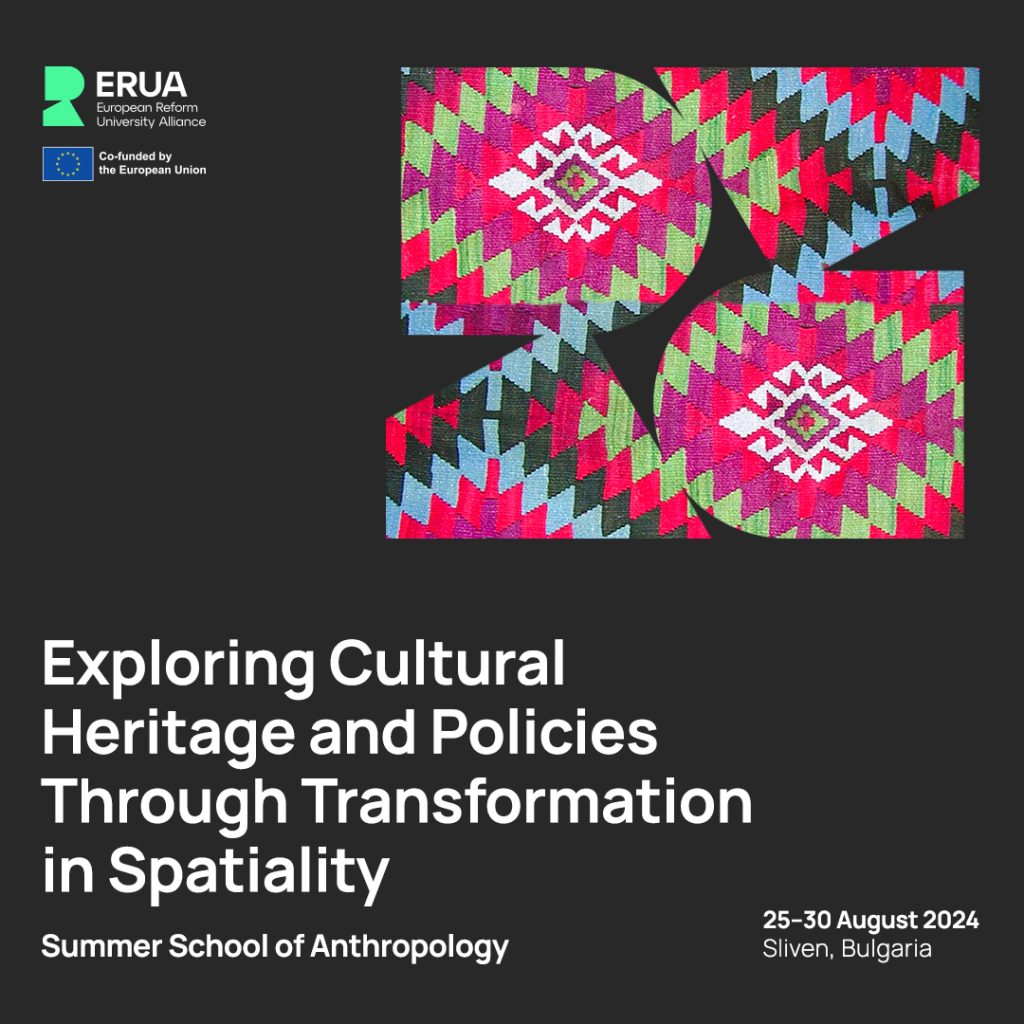25th to 30th of August 2024
Sliven, Bulgaria
Between the 25th and the 30th of August, New Bulgarian University offers a Summer School of Anthropology. The school will take place in the old and beautiful Bulgarian town Sliven.
The Summer School of Anthropology, now in its 21st year, offers interdisciplinary field research training. This year, it is hosted jointly by the NBU departments of Anthropology, Design, and Fine Arts, with support of the Sliven Regional Historical Museum.
The School welcomes students from social sciences and arts backgrounds, providing initial training in research project development and fieldwork. Its goal is to uncover interdisciplinary connections and shared challenges.
Students will engage in commented museum and gallery visits, lectures, and discussions, fostering critical thinking and individual problematization. They will delve into cultural heritage themes, with a focus this year on transformation in spatiality across different historical periods: Middle Ages, Bulgarian National Revival and modern times. The place in which the Summer School is taking place is ideal for these tasks. The origin of the town of Sliven is associated with the ancient fortress “Tuida” – an archaeological monument that testifies to the life and culture of the local population during the Middle Ages. The process of Bulgarian industrialization began with the establishment of textile factory production in Sliven in 1834. This moment is significant for both the city and the state, as it represents the step towards modernity and economic development – marking the post-Ottoman period. The city became an industrial centre and retains this function and importance to this day.
The school highlights Sliven’s textile industry and its role in shaping the city’s identity. You can uncover them in individual narratives and through the practices of tradition preservation, as well as in the official narrative and tourism. The only museum of textile industry in Bulgaria is in Sliven. Its exposition traces the development of textile crafts from 9,000 years ago to today. Students will attend demonstrations of twentieth century industrial textile machinery. Alongside textiles, participants explore other industries, examining their historical significance and contemporary relevance. Glass production will be of increased interest to the school participants looking for the connection between past, present and future. What is the place of this key industry that prospered in the past but lost its importance during the post-communist transition and in the context of globalization? The decline of the glass factory led to a dispersion of human capital, which today can be observed in small enterprises for glass production and in local trade.
The observations of the participants will centre on how Sliven’s urban landscape represents and reinterprets its past, fostering reflection on the city’s evolving historical narratives and memory construction. Some of the other observe questions are: how has the city transformed in consequence of the national emancipation (1878), the political transitions (1944 and 1990), the economic crises (1990s-2000s), and in the era of globalization? What factors turn certain places into sites of oblivion or “memory spaces”? What insights do local stories and urban/museum spaces offer? And what is the relation between individual and societal narratives?
A preparatory seminar will precede the summer school, addressing key research issues. The Course is looking for 10 Bachelor/Masters and PhD students from social sciences, humanities and the arts coming from ERUA Universities and will assign 9 ECTS.
Dates: from August 25th to August 30th, 2024
Place: Sliven, Bulgaria.
Funding: ERUA students can receive travel and accommodation funding from their home universities. Please contact your local ERUA coordinator on that topic.
If you are interested, please apply by sending an email to Slavena Nikolova at snikolova@nbu.bg, no later than the 3rd of July 2024

